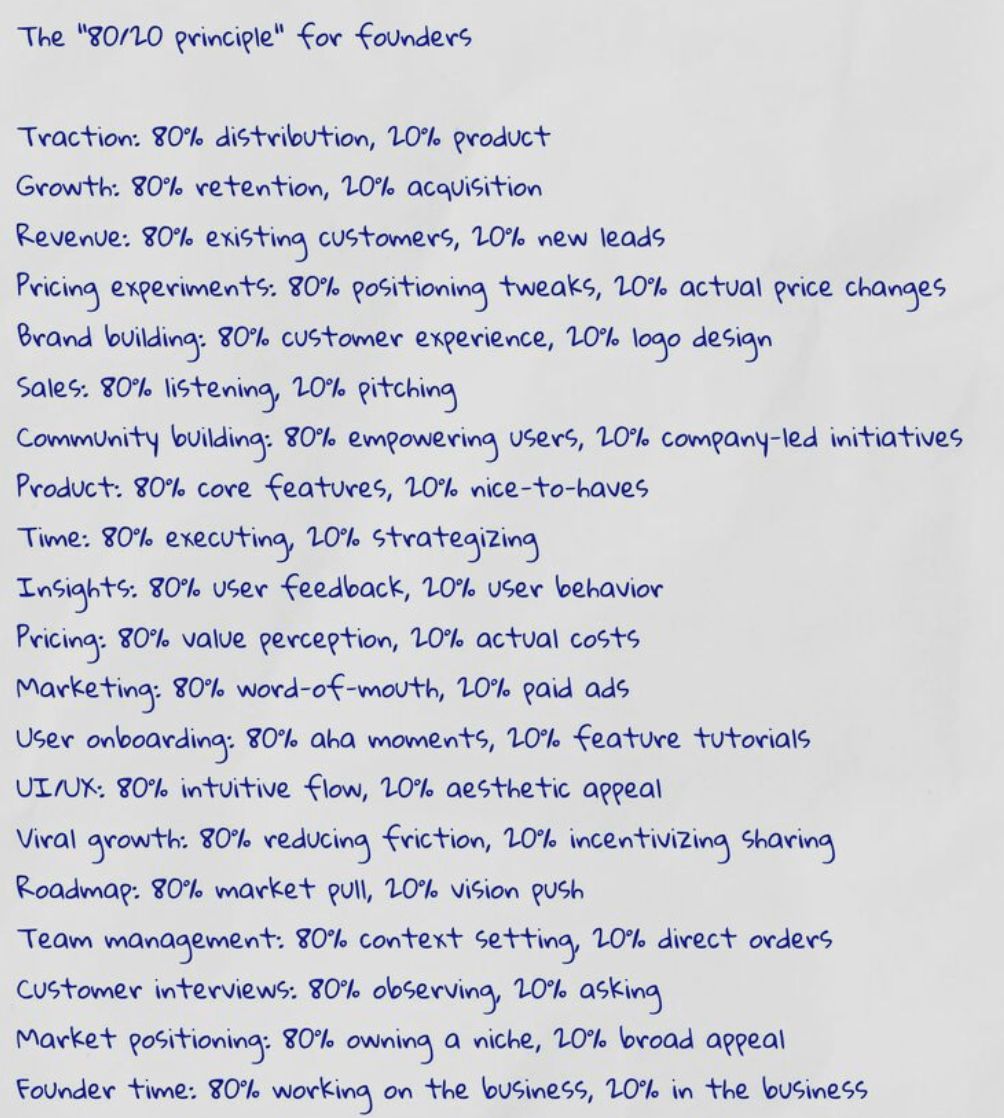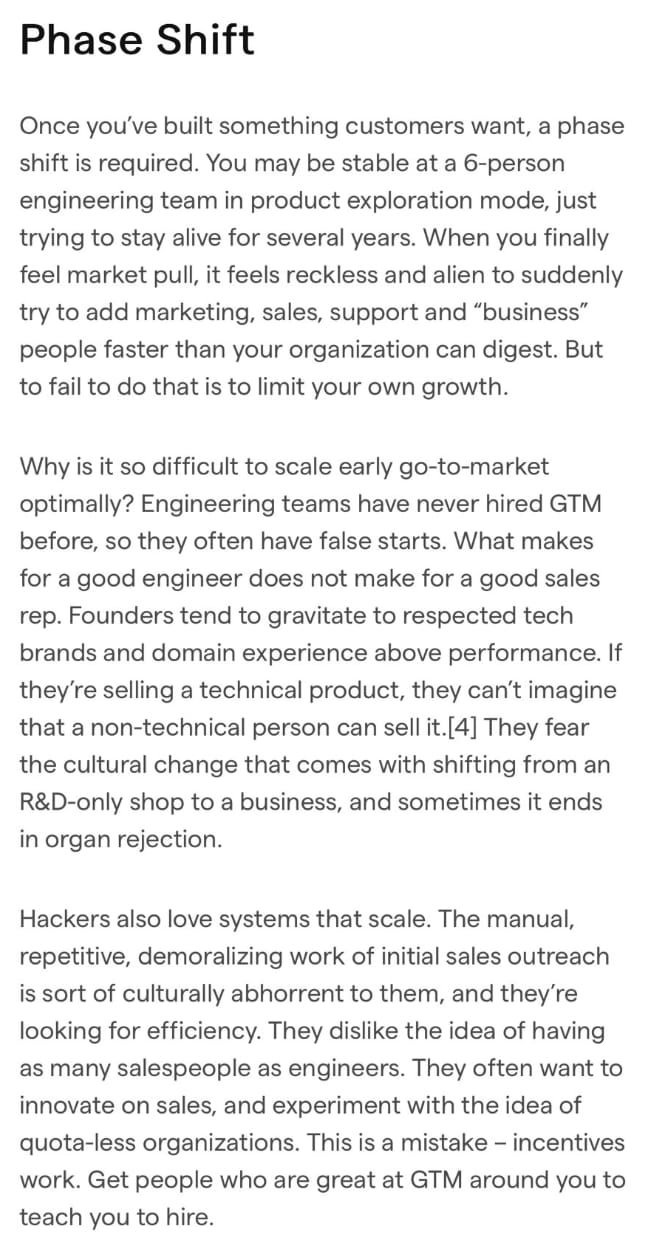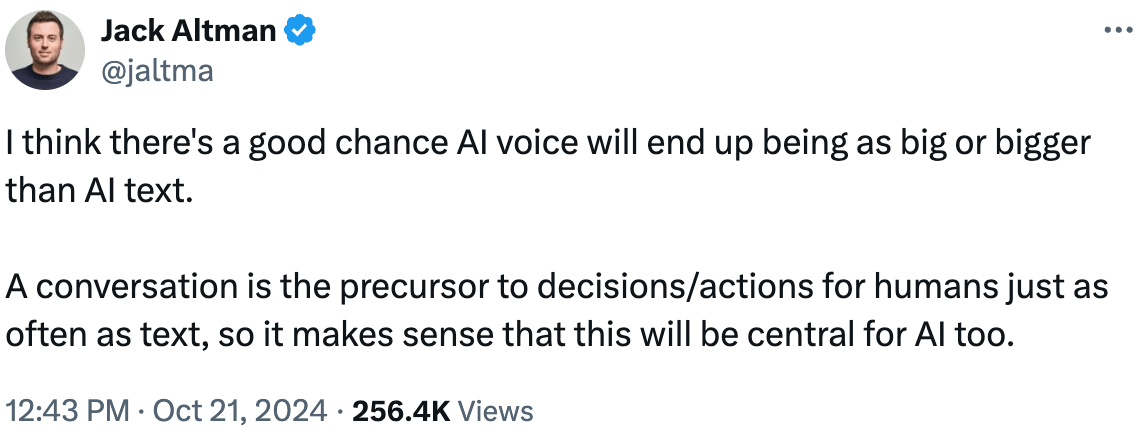Hey y’all — I’m looking to invest $200-400k in a few startups in November. Here’s what I’m looking for:
Pre-seed or seed stage
Primarily software-driven
Either B2B or B2C
(Mostly) sector-agnostic
Fill out this form or reply directly to this email and I’ll get back to you if it could be a fit!
Anyway, here’s today at a glance:
Opportunity → AI Voice
Framework → The 80/20 Principle
Tool → Remofirst
Trend → Distractions
Quote → Phase Shift
PS — Become a member to get access to my founder membership including an engaged community, fundraising support, fireside chats and more.

🔗 Houck’s Picks
My favorite finds of the week.
Fundraising
Growth
An SEO strategy that is crushing for this founder (Link)
ICYMI
Tactics to make an amazing product launch video (Link)
Personal anecdotes from Marc Andreessen on why Elon is so effective (Link)
The advice Paul Graham gave Sam Altman that not enough people take (Link)
A hiring hack for startups (Link)
More thoughts on why founder mode is so effective (Link)
6 things startup founders should avoid doing (Link)
Keith Rabois thoughts on how to hire (Link)

💡 Opportunity: AI Voice
Text-based LLMs were (still are, actually) a disruptive platform upon which many unicorns will be built.
Voice-based LLMs are the next one.
In 20 years it will seem archaic that we used to physically type into computers. The idea of a computer will be entirely different than today, likely with a different form factor.
Voice-as-an-input is the path to get there.
Opportunities to built on top of AI voice currently, right now, exist in just about every industry.
Go make a few million bucks or more 🙂
🧠 Framework: The 80/20 Principle
As Sam Altman says, it’s extremely important to spend time thinking about what to work on. Most founders don’t consider this enough.
But the most common mistake first-time founders make is planning too much after that.
In fact, you’re almost always better off getting 70-80% of the way to a perfect solution and just moving forward to the next obstacle.
As Greg Isenberg shows, this principle applies to basically everything a founder deals with:

🛠 Tool: Remofirst
Founders these days can employ the best talent around the world when scaling their teams, with the help of an Employer of Record provider.
Remofirst is an Employer of Record that allows businesses to employ talent in 180+ countries the most affordable way, without needing local entities.
They take on the responsibility of global payroll, international HR, compliance with local laws, and more, bringing the best talent in the world to your fingertips.
As a Founding Journey reader, you’ll get 2 months free on your first global hire, in any country.*
📈 Trend: The Rise of Distraction
At my first engineering job after college we used Atlassian’s HipChat to send each other DMs throughout the day.
And if you started your post-college professional life sometime after 2013 like I did, you’ve never known a world without Slack (or a similar tool like HipChat).
The reason Slack became a decacorn, and why work-chat tools are so prevalent now, is that it has a simple sales pitch: solve problems faster by getting in touch with the right person right away.
Fewer meetings too (in theory, at least).
But the tradeoff is an increase in distractions and switching costs.
Is that a positive tradeoff, in terms of productivity?
Even if it is, how should we respond to this new distraction-heavy state?
I see two ways:
Tools that help consolidate, ignore, and prioritize the distractions
Tools that create an entirely smoother experience, without even making you aware of the distractions
This isn’t a new idea, but so far no one has cracked it yet and the trend continues to rise.
LLMs are a natural tool to fight back against this.
💬 Quote: A Phase Shift
Some people would argue there are three modes a company should have:
Learning → Early stage, and occasionally after that
Scaling → Growth stage
Defending → IPO and beyond
I would argue only the first two are real. Defending is a loser’s game.
The only way to win is to grow.
With that said, founders often don’t go all-in on the second phase fast enough once they’re ready to move beyond the first:


How We Can Help
Become a member to get full access to our case study library, private founder community, and more.
We can also help your startup in a few other ways:
Content Creation
Let my team and I ghostwrite for your newsletter, X, or LinkedIn.
Audience Building
Grow your audience + generate leads with my growth service.
Fundraising
Share your round with hundreds of investors in my personal network.
Advising
I’ll help solve a specific challenge you’re facing with your startup.
Advertise in this newsletter to get in front of 60,000+ founders.

What'd you think of this issue?
“*” indicates sponsored content.



